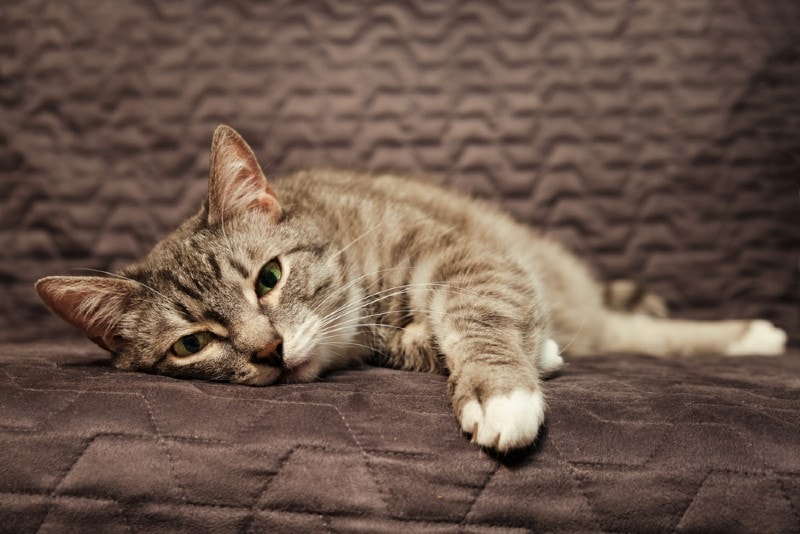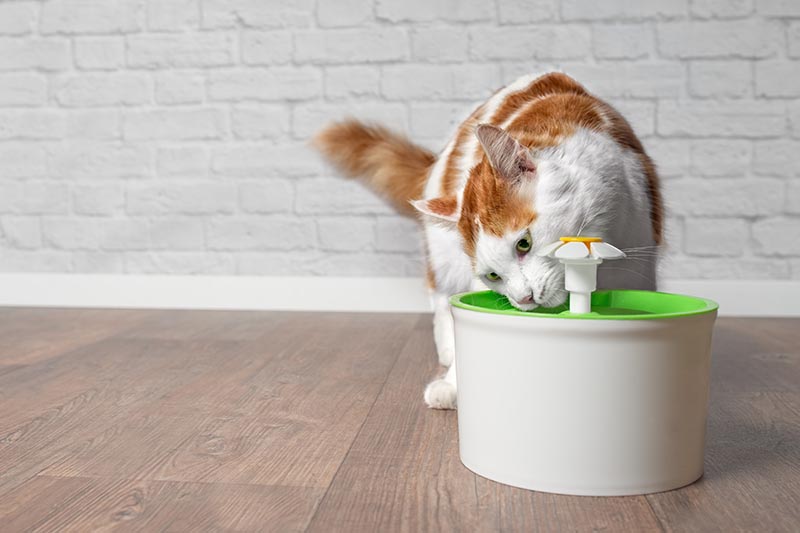
Constipation in cats is not uncommonly seen, as both excessive amounts of dry food, and issues like chronic kidney disease can potentially contribute to dry stools, dehydration, and subsequent constipation. And when you do realize your cat might be constipated, your immediate thought is to give them something to relieve their distress.
In the case of constipation, human medications such as Milk of Magnesia may seem like a potential course of action. But, can cats have Milk of Magnesia? The simple answer is a resounding no. Far better options exist for constipated cats, some of which can be purchased over the counter and easily used under the guidance of your veterinarian.
Let’s learn more about Milk of Magnesia and why it should not be used when your kitty might be facing a bout of constipation.
What Is Milk of Magnesia?
Milk of Magnesia is a laxative made by Phillips. For ages, humans have used this product to help relieve constipation. Most people who have used Milk of Magnesia prefer it to other over-the-counter laxatives due to its mild effects on the body. It’s believed that this laxative works by drawing water into the intestines and helping things get moving. Many also use Milk of Magnesia for indigestion, heartburn, or simple upset stomach.
Milk of Magnesia is an oral laxative that contains magnesium hydroxide, purified water, and sodium hypochlorite. The magnesium inside is the ingredient that seems to do the most when it comes to constipation. Magnesium is what draws water into the intestine. Magnesium hydroxide, the most active ingredient, is also ideal for helping neutralize stomach acid, which can also cause issues whether constipation is involved or not.
Can Cats Have Milk of Magnesia?
Firstly, while in most instances it is technically not toxic, it is important to remember that you should never give your pet any human medication without the guidance of your veterinarian. Secondly, many other more appropriate options exist for possibly constipated cats, that have fewer side effects, and more directly deal with the issue at hand. Some of these involve tasteless powders that can easily be mixed into foods and are well-accepted by most cats.
Here are a few factors your veterinarian will consider when making a recommendation for the treatment of constipation in your cat:
- Hydration status
- Appetite changes
- Age
- Chronic health issues the cat may suffer from
- Medications the cat takes
As you can see, there are several important factors to consider before selecting a treatment protocol. This is why that decision should be left up to your veterinarian.
Are You Sure It’s Constipation?
One of the most important reasons you should contact your veterinarian before treating your cat is to determine whether they are actually constipated. Yes, if your kitty is an indoor pet, you know pretty quickly when something isn’t right with their bowel movements. You are the one who cleans their litter box. However, it is easy for most vets to feel a cat’s abdomen and know quickly whether constipation is a concern, and to what level. Some cats with constipation require hospitalization if the condition is severe. In these instances, it can be deadly to attempt to treat constipation at home. In other instances, it may look like your cat is constipated, when indeed something else, such as a urinary blockage, or bladder infection, is occurring. Similarly, some of these conditions can be an emergency and even fatal if left undiagnosed.

Top 3 Other Ways to Relieve Your Cat’s Constipation
In general, it is easiest to try to prevent constipation in your cat. Doing so will generally require making a plan with your vet, along with daily initiative to keep constipation from happening. This may include various options.
1. Daily stool softeners
Daily cat-specific stool softeners may be added to your cat’s food or water, and help draw water into the colon to keep stools soft. These can be given in various amounts, to keep things healthy and moving through the colon. The downside is too much stool softener can lead to loose stools or diarrhea!
2. Proper Hydration
Lack of hydration or complete dehydration is one of the main reasons cats suffer from constipation. Some cats prefer not to drink standing water. These are the cats you often find trying to sip water from the sink or tub faucet. If you feel your cat isn’t drinking enough, try a water fountain. Many cats prefer this type of hydration station. Wet food is another way to help increase your cat’s hydration as well.
3. Proper Exercise
Obese, inactive cats seem more prone to having bowel issues such as constipation, whereas a cat that’s on the move will keep their bowels moving. Proper exercise will help your cat’s intestines stay in good shape. Try interactive toys and games your cat enjoys.

When to Contact Your Vet
As we’ve already mentioned, a vet should always be called before you attempt treatment for constipation. Whenever constipation is involved, your cat needs to be monitored closely. If your cat hasn’t used the bathroom in 24 hours, has blood in its stool, stops grooming, doesn’t eat or drink for up to 24 hours, or has increased signs of fatigue contact your veterinarian immediately.
Final Thoughts
Milk of Magnesia is a human constipation reliever and should not be used in cats. In exceptional instances, a veterinarian may resort to this option, and provide close guidance during the process. Far safer and more appropriate cat-friendly options exist for constipated cats in the modern world, but always remember that other illnesses can also mimic constipation, and need a veterinary visit to diagnose properly.
Featured Image Credit: luchschenF, Shutterstock








